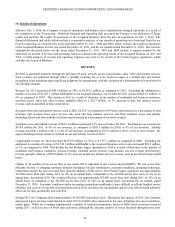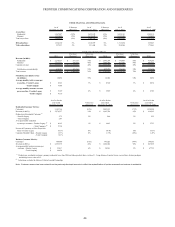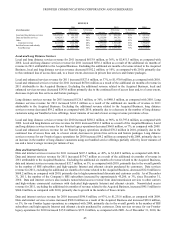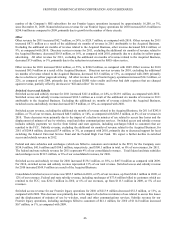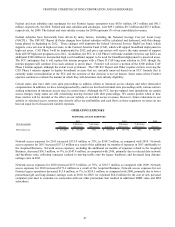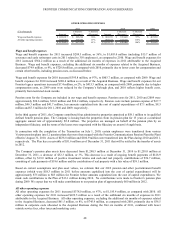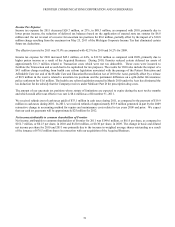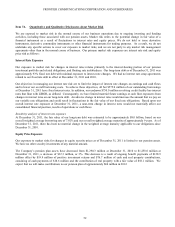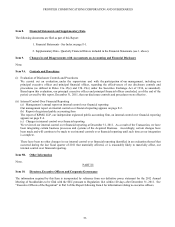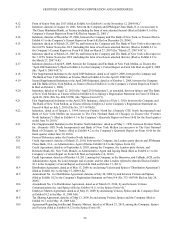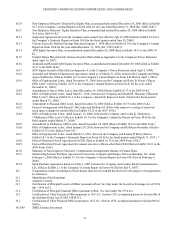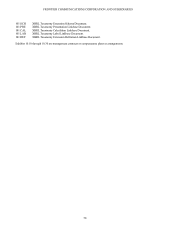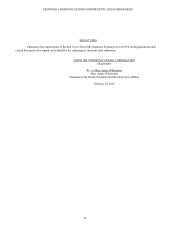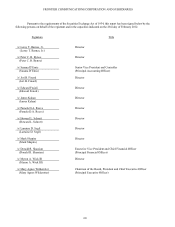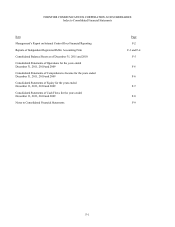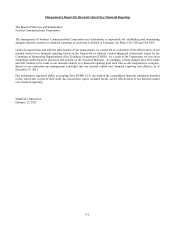Frontier Communications 2011 Annual Report Download - page 55
Download and view the complete annual report
Please find page 55 of the 2011 Frontier Communications annual report below. You can navigate through the pages in the report by either clicking on the pages listed below, or by using the keyword search tool below to find specific information within the annual report.
FRONTIER COMMUNICATIONS CORPORATION AND SUBSIDIARIES
52
Item 7A. Quantitative and Qualitative Disclosures about Market Risk
We are exposed to market risk in the normal course of our business operations due to ongoing investing and funding
activities, including those associated with our pension assets. Market risk refers to the potential change in fair value of a
financial instrument as a result of fluctuations in interest rates and equity prices. We do not hold or issue derivative
instruments, derivative commodity instruments or other financial instruments for trading purposes. As a result, we do not
undertake any specific actions to cover our exposure to market risks, and we are not party to any market risk management
agreements other than in the normal course of business. Our primary market risk exposures are interest rate risk and equity
price risk as follows:
Interest Rate Exposure
Our exposure to market risk for changes in interest rates relates primarily to the interest-bearing portion of our pension
investment portfolio and related obligations, and floating rate indebtedness. Our long-term debt as of December 31, 2011 was
approximately 93% fixed rate debt with minimal exposure to interest rate changes. We had no interest rate swap agreements
related to our fixed rate debt in effect at December 31, 2011 and 2010.
Our objectives in managing our interest rate risk are to limit the impact of interest rate changes on earnings and cash flows
and to lower our overall borrowing costs. To achieve these objectives, all but $575.0 million of our outstanding borrowings
at December 31, 2011 have fixed interest rates. In addition, our undrawn $750.0 million revolving credit facility has interest
rates that float with LIBOR, as defined. Consequently, we have limited material future earnings or cash flow exposures from
changes in interest rates on our long-term debt. An adverse change in interest rates would increase the amount that we pay on
our variable rate obligations and could result in fluctuations in the fair value of our fixed rate obligations. Based upon our
overall interest rate exposure at December 31, 2011, a near-term change in interest rates would not materially affect our
consolidated financial position, results of operations or cash flows.
Sensitivity analysis of interest rate exposure
At December 31, 2011, the fair value of our long-term debt was estimated to be approximately $8.0 billion, based on our
overall weighted average borrowing rate of 7.92% and our overall weighted average maturity of approximately 9 years. As of
December 31, 2011, there has been no material change in the weighted average maturity applicable to our obligations since
December 31, 2010.
Equity Price Exposure
Our exposure to market risks for changes in equity security prices as of December 31, 2011 is limited to our pension assets.
We have no other security investments of any material amount.
The Company’s pension plan assets have decreased from $1,290.3 million at December 31, 2010 to $1,258.0 million at
December 31, 2011, a decrease of $32.3 million, or 3%. This decrease is a result of ongoing benefit payments of $128.9
million offset by $19.9 million of positive investment returns and $76.7 million of cash and real property contributions,
consisting of cash payments of $18.6 million and the contribution of real property with a fair value of $58.1 million. We
expect that we will make contributions to our pension plan of approximately $60 million in 2012.


